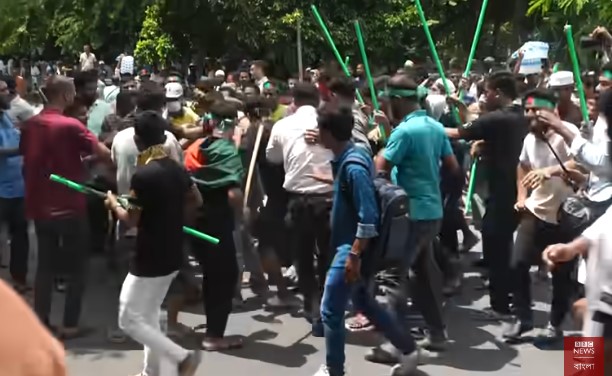Newsman: Hundreds of student protesters and political activists armed with bamboo sticks, iron rods and pipes have assaulted supporters of the ousted Bangladeshi Prime Minister, Sheikh Hasina, and people irrespectively who ever wanted to pay homage to the founding father of the country ‘Bangladesh,’ Bangabandhu Seikh Mujibur Rahman. Protesters held a party overnight using loudspeakers and playing songs as they danced outside the museum. Videos of the party went viral on social media.
World’s renowned news media ‘The Guardian’ on their !5th August publication reported, Hundreds of student protesters and political activists armed with bamboo sticks, iron rods and pipes have assaulted supporters of the ousted Bangladeshi Prime Minister, Sheikh Hasina, from reaching the former house of Sheikh Hasina’s father Shekh Mujibur Rahman, the assassinated independence leader.
The house turned into a museum capital was to showcase narratives and other objects about a military coup on 15 August 1975, when Shekh Mujibur Rahman was killed along with most of his family members. The house, now called Bangabandhu Memorial Museum, was torched by the protesters hours after Hasina’s downfall on 5 August following an uprising during which more than 300 people were killed, report says.
The Guardian also reported the protesters, who first arrived at Rahman’s house on Wednesday, attacked a prominent actor as she, along with dozens of Hasina’s supporters, reached there to light candles as part of the commemoration.
On Thursday, the protesters attacked Hasina’s supporters who attempted to get to the site, manhandling many and checking the visitors’ phones and identity cards. Journalists were threatened for filming at the scene, witnesses said.
Another group of protesters on Thursday chanted “Naraye Takbeer, Allahu Akbar” (“Allah is great, shout of Allah is great”) as they marched through streets in the area where the museum site remained blocked with barbed-wire fences, report says.
They held a party overnight using loudspeakers and playing songs as they danced outside the museum, which was set on fire during the anti-government demonstrations earlier this month. Videos of the party went viral on social media.
According to the Guardian report, the protesters said they were out to stop the gathering of Hasina’s supporters as they could attempt to create chaos in the name of commemoration.
Sarjis Alam, an organiser of the student protests, said that they would continue to demand the trial of Hasina as he led a rally on Thursday in Dhaka’s Shahbagh area. Asked about the harassment of journalists by the students and other activists outside the museum, he said he would inquire bout that but gave no details, according to ‘The Guardian.’
The Guardian says, “In the past, large gatherings took place on the premises of the museum, seen by many as a source of inspiration. Sheikh Hasina had asked supporters earlier this week to “pray for the salvation of all souls by offering floral garlands and praying” outside the museum, in her first public statement since her departure”.
The Guardian report said, Sheikh Mujibur Rahman is fondly called Bangabandhu (friend of Bengal). Thursday is the anniversary of his death, and Hasina, now self-exiled in India, urged her supporters to commemorate the day by paying respects to him. Previously, 15 August was a public holiday and was observed as a national mourning day by Hasina’s administration. But that has been cancelled by the interim government led by the Nobel laureate Muhammad Yunus after the ousting of Hasina, who survived in 1975 along with her younger sister because they were visiting Germany.
Sam Jahan, a video journalist for Reuters, spoke out against the harassment in a Facebook post. “It is fair enough what you, the political activists, student protesters want to achieve, politically. But when you try to stop my rolling camera, resisting the freedom of the press and when you manhandle my colleagues, I will speak up,” Jahan wrote.
The country’s leading English-language Daily Star newspaper said its journalists faced trouble at the scene and were forced to delete photos and videos.
Mujib Mashal, the south Asia bureau chief of the New York Times, said in a video post on X that it was “complete mob rule”.
“The victims of yesterday are perpetrators of today; men armed with clubs and pipes (many identified themselves as BNP and Jamaat) thrashing and chasing away anyone they suspect of being Awami League,” he said.
The protesters have been demanding Hasina go on trial for the killings during weeks-long violence and cases have already been filed against her and other close party colleagues and top police officials.
More than 300 people were killed in unrest that started in July with protests against a quota system for government jobs that later morphed into a movement against what was considered sheikh Hasina’s increasingly autocratic administration. The uprising eventually forced Sheikh Hasina to leave office and flee to India, ending her 15-year rule, The Guardian reports.
Muhammad Yunus, founder of the Grameen Bank and a Nobel laureate took over as the interim leader. Sixteen people, including two student protest leaders and others, drawn mainly from civil society, have been included in the interim cabinet.
Muhammad Yunus chose the new cabinet members after talks between student leaders, civil society representatives and the military.

